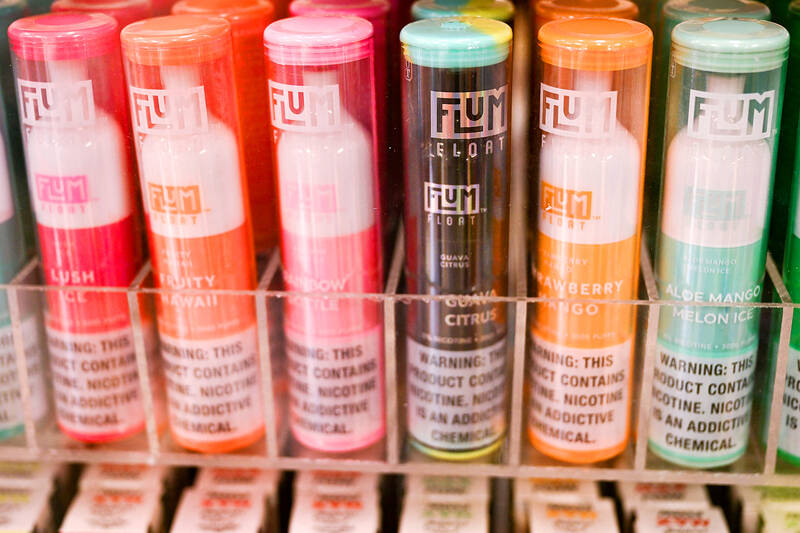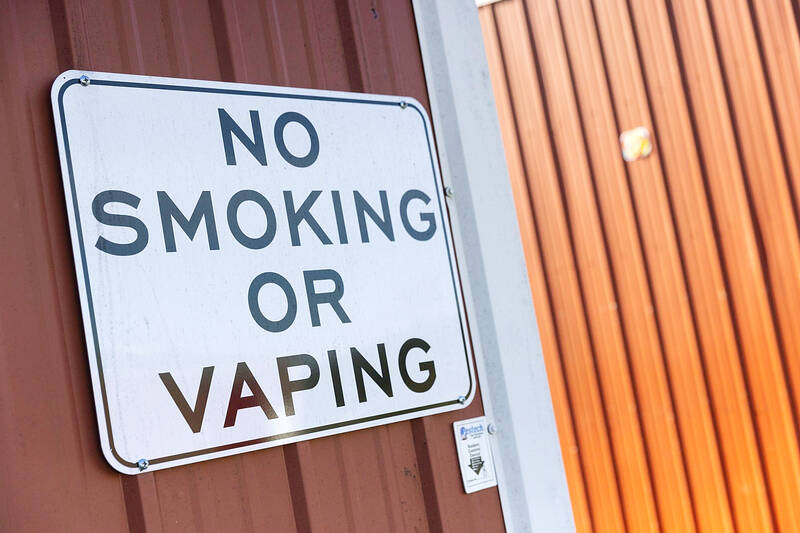Australia banned recreational vaping and tightened other aspects of e-cigarette laws on Tuesday last week in the biggest crackdown on the tobacco industry in more than a decade to try to stop an alarming rise in teenage vaping.
The government aims to ban all disposable vapes, which often come in fruity flavors, ban the import of non-prescription vapes and limit nicotine levels, aiming for the sale of vapes to be confined to helping smokers quit.
“Just like they did with smoking, Big Tobacco has taken another addictive product, wrapped it in shiny packaging and added flavors to create a new generation of nicotine addicts,” Health Minister Mark Butler said in a speech at the National Press Club.

Photo: AFP 照片:法新社
Under the new rules, vapes will be sold only in pharmacies and require “pharmaceutical-type” packaging.
Vaping, widely seen as a safer alternative to smoking cigarettes and useful for helping smokers quit, involves heating a liquid that contains nicotine in what is called an e-cigarette and turning it into a vapor that users inhale.
But studies have shown the potential of long-term harm from the addictive e-cigarettes.

Photo: Bloomberg 照片:彭博社
Butler said vaping had become a recreational product in Australia, mostly sold to teenagers and young people, who are three times as likely to take up smoking.
“This is a product targeted at our kids, sold alongside lollies and chocolate bars,” Butler said. “Vaping has now become the number one behavioral issue in high schools. And it’s becoming widespread in primary schools as well.”
Doctors backed the vaping crackdown but urged the government to do more to limit the number of young people taking it up.
“Nicotine vaping products are being sold featuring colorful flavors and we have even seen products featuring the same type of imagery as children’s breakfast cereal including cartoon characters,” said Nicole Higgins, president of the Royal Australian College of General Practitioners.
About 22 percent of Australians aged 18-24 have used an e-cigarette or vaping device at least once, data last year showed.
Though a prescription is needed to buy nicotine vapes in Australia, a thriving illegal market means they are readily available.
(Reuters)
澳洲上週二對消遣用電子煙發出禁令,並緊縮電子煙其他相關法律,這是十多年來對煙草業的最大規模打擊,為的是抑止青少年吸食電子煙的驚人增長。
政府的目標是禁止所有拋棄式電子煙(這些電子煙通常帶有水果味)、禁止進口非處方電子煙,並限制尼古丁含量,目的是將電子煙的銷售限縮於幫助吸煙者戒菸。
澳洲衛生部長馬克‧巴特勒在國家新聞俱樂部所發表的演說中說道:「大煙草公司就像對吸菸所做的那樣,他們用另一種令人上癮的產品,外加閃亮的包裝並添加口味,以創造新一代的尼古丁成癮者」。
根據新規定,電子煙未來只能在藥局販售,並且需以「藥品類」包裝。
電子煙是用電子煙裝置將含有尼古丁的液體加熱,將其轉化為蒸汽讓使用者吸入。電子煙被廣泛認為是一種更安全的香菸替代品,可幫助吸菸者戒菸。
但研究顯示,令人上癮的電子煙可能會造成長期傷害。
巴特勒說,電子煙在澳洲已成為一種消遣用產品,主要賣給青少年和年輕人,他們養成吸菸習慣的可能性是其他人的三倍。
「這是一種針對我們孩子的產品,它們跟棒棒糖和巧克力棒一起銷售」,巴特勒說。「電子煙現在已經成為高中的頭號行為問題。而且它在小學也越來越普遍」。
醫師們支持打擊電子煙,但敦促政府採取更多措施來限制吸食電子煙的年輕人數量。
澳洲皇家全科醫師學會會長妮可‧希金斯說:「市面上的尼古丁電子煙產品,有豐富多彩的口味,我們甚至還能看到產品上有跟兒童早餐麥片同類的圖像,包括卡通人物」。
去年的數據顯示,在18至24歲的澳洲人中,大約有22%至少用過一次電子煙或電子煙裝置。
雖然在澳洲需要醫師處方才能購買尼古丁電子煙,但活躍的黑市意味它們很容易買到。
(台北時報林俐凱編譯)

In an effort to fight phone scams, British mobile phone company O2 has introduced Daisy, an AI designed to engage phone con artists in time-wasting conversations. Daisy is portrayed as a kindly British granny, exploiting scammers’ tendency to target the elderly. Her voice, based on a real grandmother’s for authenticity, adds to her credibility in the role. “O2” has distributed several dedicated phone numbers online to direct scammers to Daisy instead of actual customers. When Daisy receives a call, she translates the scammers’ spoken words into text and then responds to them accordingly through a text-to-speech system. Remarkably, Daisy

Bilingual Story is a fictionalized account. 雙語故事部分內容純屬虛構。 Emma had reviewed 41 resumes that morning. While the ATS screened out 288 unqualified, she screened for AI slop. She could spot it a mile away. She muttered AI buzzwords like curses under her breath. “Team player.” “Results-driven.” “Stakeholder alignment.” “Leveraging core competencies.” Each resume reeked of AI modeling: a cemetery of cliches, tombstones of personality. AI wasn’t just changing hiring. It was draining the humanity from it. Then she found it: a plain PDF cover letter. No template. No design flourishes. The first line read: “I once tried to automate my

Every May 1, Hawaii comes alive with Lei Day, a festival celebrating the rich culture and spirit of the islands. Initiated in 1927 by the poet Don Blanding, Lei Day began as a tribute to the Hawaiian custom of making and wearing leis. The idea was quickly adopted and officially recognized as a holiday in 1929, and leis have since become a symbol of local pride and cultural preservation. In Hawaiian culture, leis are more than decorative garlands made from flowers, shells or feathers. For Hawaiians, giving a lei is as natural as saying “aloha.” It shows love and

1. 他走出門,左右看一下,就過了馬路。 ˇ He walked outside, looked left and right, and crossed the road. χ He walked outside and looked left and right, crossed the road. 註︰並列連接詞 and 在這句中連接三個述語。一般的結構是 x, y, and z。x and y and z 是加強語氣的結構,x and y, z 則不可以。 2. 他們知道自己的弱點以及如何趕上其他競爭者。 ˇ They saw where their weak points lay and how they could catch up with the other competitors. χ They saw where their weak points lay and how to catch up with the other competitors. 註:and 一般連接同等成分,結構相等的單詞、片語或子句。誤句中 and 的前面是子句,後面是不定詞片語,不能用 and 連接,必須把不定詞片語改為子句,and 前後的結構才相等。 3. 她坐上計程車,直接到機場。 ˇ She took a cab, which took her straight to the airport. ˇ She took a cab and it took her straight